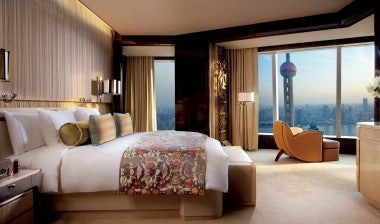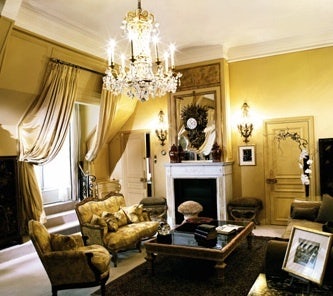Ritz-Carlton Pudong At Shanghai IFC Features 285 Rooms, Views Of Bund & Skyline#

While it's a bit late to be lumped in with Shanghai's pre-Expo "hotel boom," the newly opened Ritz-Carlton Shanghai, Pudong -- located within the Shanghai International Finance Center (Shanghai ifc) -- is the city's latest and greatest. Featuring 285 rooms and views of Shanghai's impressive skyline and the recently renovated Bund, the Ritz-Carlton Shanghai, Pudong is billed by the company as "Shanghai's ultimate destination for luxury and style."
From impressions gleaned from Gadling's pre-opening profile of the Ritz-Carlton, that actually sounds about right.
Flanked on either side by luxury retailers including Giorgio Armani and Louis Vuitton, the hotel accentuates luxury in a modern Mandarin-style shell. While the exterior of the hotel looks like another Shanghai skyscraper, the interior is a feast for the senses.
Crystal chandeliers set against gold and black walls create the mood as you walk into the lobby. After the guest services member greets you at the lobby-floor level, you'll head to the 52nd floor for check-in (the hotel occupies the top 14 floors of the building). But there's something enchanting about the scene as you ascend. Soft lighting against the dark walls of the interior compel you to touch just about anything in your reach. The "old-world glamour" interior in the modern building is enchanting and enticing, and it doesn't disappoint. With interior designs by Richard Farnell, the Ritz-Carlton Shanghai, Pudong, sets a new standard in hotel decor: sensory enlightenment.
Considering Ritz-Carlton has fast-tracked the opening of two hotels in a short span of time in Shanghai -- and have recently said the company plans to double its China locations by 2015 -- it's perhaps not surprising that a premium is being placed on tapping the nascent growth in regional travel among middle-class Chinese or business travelers. As Bob Kharazmi, senior vice president of Ritz-Carlton International, told Shanghai Daily at yesterday's grand opening of the Ritz-Carlton Shanghai Pudong, "We will build our hotels where our customers go and as the global leisure market is recovering gradually, it's much faster in China."
What's interesting as well is that Ritz-Carlton, beyond its broader expansion push, is looking to get in on the "exclusivity" game -- as if a world-class luxury hotel wasn't exclusive enough in China -- announcing yesterday that the Ritz-Carlton "Reserve," a new, more private luxury hotel sub-brand, will soon be introduced to the Chinese market. Why, exactly, is this interesting? Because over the past 10-15 years, wealthy Chinese with the financial means to stay at a "Reserve"-level hotel have typically vacationed overseas. Will the "Reserve" entice them to engage in high-end domestic travel? We'll have to wait and see.

On the other side of the world, and at a different "Ritz" altogether, the importance of Chinese travelers to the global hotel industry was further reiterated, as Omer Acar, general manager of the Ritz Hotel Paris, sat down with the Wall Street Journal to discuss what his hotel is doing to accommodate the Chinese elites who are becoming something of a fixture in the French capital, and what he learned on a recent trip to China about what makes Chinese guests "tick" -- from special-edition Christofle chopsticks or day-long shopping sprees to a stay in the Chanel Suite.
From the interview:
WSJ: How has Chinese tourism to France changed in recent years?
Mr. Acar
: Ten or 15 years ago, they always came in large tour groups because you get the sense there was a fear of traveling alone in an unknown place. But nowadays, they come by themselves, book their three-star Michelin restaurants, and know just what bottle of wine they prefer with their food.
WSJ: What changes have you made for Chinese guests?
Mr. Acar
: We have a Mandarin-speaking guest relationship manager and translators on hand. There are Chinese menus, and even in a gastronomic restaurant, we offer chopsticks, and we're much more international. If you want to start off with sushi, then have wonton noodles, and finish with a French dessert, we cannot say "no."
WSJ
: What are the most popular hotel requests from Chinese customers?
Mr. Acar
: There's a big focus on luxury brands, from watches to fashion—all limited collectibles. What they want from us is simple: find it. Even if these items are available in Shanghai or Hong Kong, there's a value to buying it in Paris, in the flagship store. Just a few days ago, I was in the lobby preparing for my China trip when a group of tourists from Hangzhou came back with a car that I can only say looked like a miniature Hermès boutique because it was piled high with so many Hermès boxes.